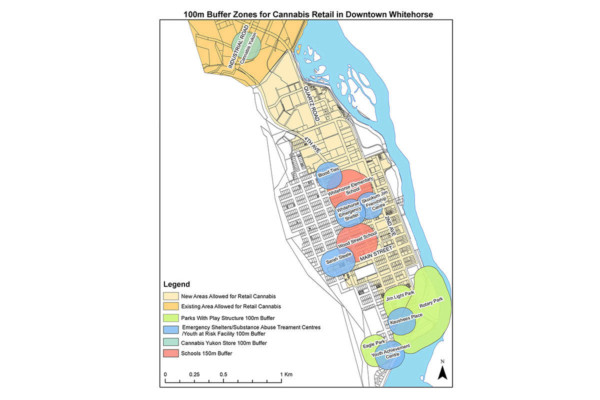You are here
Home 🌿 Recreational Marijuana News 🌿 Whitehorse council considers allowing pot shops in the downtown core 🌿Whitehorse council considers allowing pot shops in the downtown core

City staff are recommending privately-owned cannabis shops be allowed in Whitehorse’s downtown core, including on Main Street, council heard at the Feb. 18 standing committees meeting.
In 2018, council created a new type of zoning – “Retail Sales, Restricted” – specifically to handle the sale of marijuana and related products. At the time it was implemented it was limited to the Marwell area, where the government-owned pot shop has already opened.
Staff are now recommending that limitation be lifted and that pot shops be permitted in “high-intensity commercial and mixed-use areas” of downtown Whitehorse, according to a report presented to council. This would include areas zoned for core or mixed-use commercial, mixed-used waterfront, service commercial or commercial parking.
The downtown area is being proposed because it is “centrally located,” is transit accessible, has “generally good street parking,” and is an area where people already expect a higher density of traffic. Additionally, the area is already frequented by tourists, and pot is “anticipated to be a product of fairly high interest from tourists,” Melodie Simard, manager of planning and sustainability for the city told council.
That doesn’t mean just any building in the downtown core can be flipped over and turned into a pot shop, however. Shops would have to be at least 100 metres away from each other, essentially limiting them to one per block, as well as 100 m from emergency shelters, addiction treatment centres and “parks containing a play structure,” which would include areas like Rotary Park but not Shipyards Park.
The Yukon government had already mandated that pot shops be 150 m away from schools. Although the city is permitted to adjust with that distance, staff are recommending adhering to it, said Simard.
“In general, a cautious approach to regulations is prudent, because the long-term health impacts of cannabis consumption are still unknown,” Simard said. “If regulations are later deemed to be excessive, subsequent processes … will allow council to consider changes.”
A recent survey conducted by the city showed that, of 161 respondents, 75 per cent said they supported private pot shops in the downtown Whitehorse area.
It’s unusual for a survey to be undertaken so early in the game, Simard said, but council “felt strongly this (issue) required a lot of public engagement.”
Coun. Laura Cabott wanted to know if the proposed buffering and setbacks would prevent “too many” licenses from being issued, or the “clustering” of pot shops. Cabott was concerned about a concentration of shops causing an area to become known as “the cannabis neighbourhood.”
Simard said the limitations imposed by the buffering would prevent that, as the location requirements produced sufficient limitations.
Staff are not recommending limiting the total number of pot shops permitted to operate in the city, said Simard. Other similarly sized municipalities have taken a similar approach, she noted.
“We don’t cap any (type) of land use (in the city) and (to do so) would have been an entirely new approach for us,” she said.
There are also currently no proposed limitations surrounding placement between pot shops and offsales, Simard said, noting that would require a “much more involved process.”
Jordi Mikeli-Jones appeared before council as a delegate on the subject of pot shops. Mikeli-Jones is actively seeking to open her own cannabis retail store and said she supported buffer zones and “balanced regulation fame work” for cannabis sales.
Mikeli-Jones urged council to move quickly on its decision, as delay would cause financial harm to people trying to get into the retail game, such as herself.
Council will consider whether or not to bring the recommendations forward for first reading under the bylaw process at the Feb. 25 regular council meeting.
If it passes that reading, it will trigger a public hearing on the matter, which is tentatively scheduled for March 25.
Under the bylaw process, the earliest possible date the rejigged zoning to allow pot shops in the downtown core could be approved is April 8.
Similar to alcohol, while the city gets a say in where pot shops can be, it’s the territory which actually grants licenses to sell pot. The governing department – the Yukon Liquor Corporation – announced Feb. 19 via press release that it will begin accepting applications for private retail cannabis licenses on Feb. 20.
420 Intel is Your Source for Marijuana News
420 Intel Canada is your leading news source for the Canadian cannabis industry. Get the latest updates on Canadian cannabis stocks and developments on how Canada continues to be a major player in the worldwide recreational and medical cannabis industry.
420 Intel Canada is the Canadian Industry news outlet that will keep you updated on how these Canadian developments in recreational and medical marijuana will impact the country and the world. Our commitment is to bring you the most important cannabis news stories from across Canada every day of the week.
Marijuana industry news is a constant endeavor with new developments each day. For marijuana news across the True North, 420 Intel Canada promises to bring you quality, Canadian, cannabis industry news.
You can get 420 Intel news delivered directly to your inbox by signing up for our daily marijuana news, ensuring you’re always kept up to date on the ever-changing cannabis industry. To stay even better informed about marijuana legalization news follow us on Twitter, Facebook and LinkedIn.




